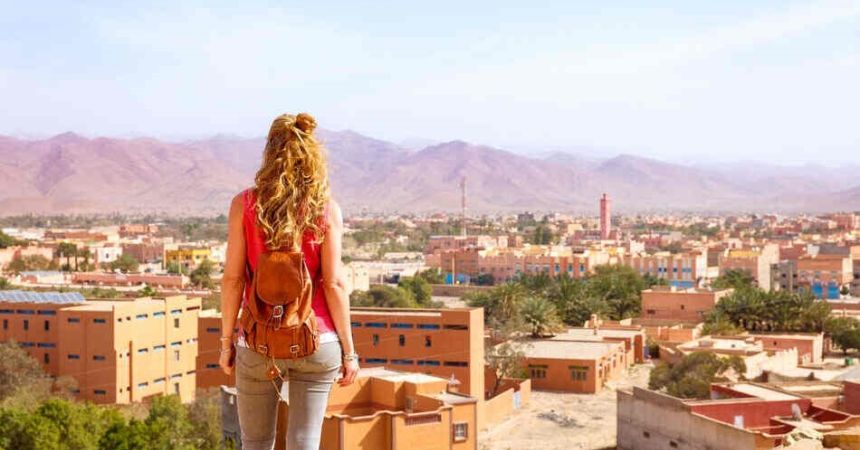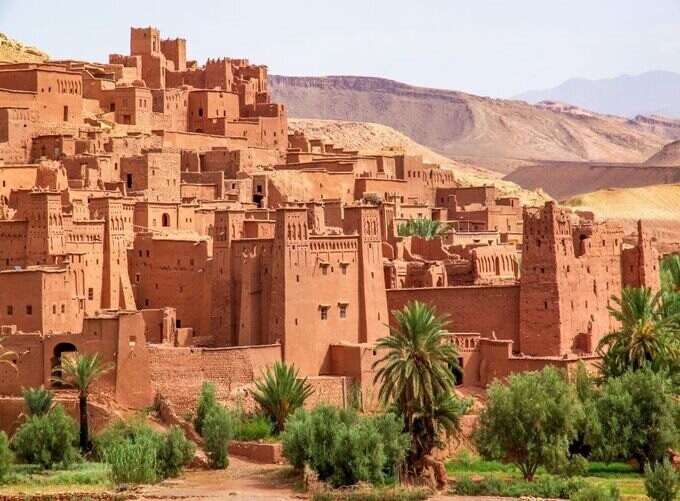
How Long to Spend in Morocco: First-Timer Itinerary
Morocco is a country of diverse landscapes, rich history, and vibrant culture. Deciding how long to spend in Morocco depends on your interests and the experiences you seek. Whether you have a few days or a few weeks, this guide will help you make the most of your time in Morocco, highlighting key destinations and activities to ensure an unforgettable trip.
Understanding Morocco’s Main Attractions
Cities and Cultural Hubs
- Marrakech: Known for its bustling souks, historical palaces, and vibrant Jemaa el-Fnaa square.
- Fes: Famous for its medieval medina, Al-Qarawiyyin University, and traditional tanneries.
- Casablanca: The economic hub with the impressive Hassan II Mosque.
- Rabat: The capital city, known for its historical sites and coastal beauty.
- Chefchaouen: The Blue City, renowned for its picturesque blue-washed streets.
- Essaouira: A coastal city with a relaxed atmosphere, historic medina, and beautiful beaches.
Natural Wonders
- Sahara Desert: Experience the vast sand dunes of Erg Chebbi or Erg Chigaga.
- Atlas Mountains: Ideal for trekking, with peaks like Mount Toubkal.
- Dades and Todra Gorges: Known for their dramatic rock formations and hiking trails.
- Coastal Areas: Beautiful beaches in Essaouira, Agadir, and the Mediterranean coast.
Historical Sites
- Ait Benhaddou: An ancient fortified village and UNESCO World Heritage site.
- Volubilis: Well-preserved Roman ruins.
- Meknes: Known for its grand gates and historical significance.
Suggested Itineraries Based on Time
3-Day Itinerary: Highlights of Marrakech
Day 1: Exploring Marrakech
- Morning: Arrive in Marrakech and check into your accommodation. Begin your exploration at Jemaa el-Fnaa.
- Afternoon: Visit the Koutoubia Mosque and Bahia Palace.
- Evening: Dinner at a rooftop restaurant overlooking Jemaa el-Fnaa.
Day 2: Historical and Cultural Sites
- Morning: Visit the Saadian Tombs and El Badi Palace.
- Afternoon: Explore the Majorelle Garden and the Yves Saint Laurent Museum.
- Evening: Wander through the medina and souks, and enjoy dinner at a traditional restaurant.
Day 3: Day Trip to the Atlas Mountains
- Morning: Early departure to the Atlas Mountains, visit Imlil village.
- Afternoon: Guided hike to nearby waterfalls and lunch with a Berber family.
- Evening: Return to Marrakech and relax at a hammam.
7-Day Itinerary: Imperial Cities and Desert Adventure
Day 1-3: Marrakech
- Follow the 3-day Marrakech itinerary above.
Day 4: Travel to Fes via Meknes
- Morning: Depart for Fes, stopping in Meknes.
- Afternoon: Explore Bab Mansour and Place El-Hedim in Meknes.
- Evening: Arrive in Fes, check into your accommodation, and have dinner in the medina.
Day 5: Discovering Fes
- Morning: Visit Al-Qarawiyyin University and Bou Inania Madrasa.
- Afternoon: Explore the Chouara Tannery and Fes el-Bali.
- Evening: Dinner in a traditional riad.
Day 6: Sahara Desert Excursion
- Morning: Depart for Merzouga, the gateway to the Erg Chebbi dunes.
- Afternoon: Arrive in Merzouga, prepare for a camel trek into the desert.
- Evening: Enjoy a sunset camel trek and spend the night in a desert camp.
Day 7: Return to Fes
- Morning: Sunrise in the desert and return to Merzouga.
- Afternoon: Travel back to Fes, with scenic stops along the way.
- Evening: Arrive in Fes for a relaxing evening.
10-Day Itinerary: Coastal and Mountain Exploration
Day 1-3: Marrakech
- Follow the 3-day Marrakech itinerary above.
Day 4-5: Essaouira
- Day 4: Travel to Essaouira. Explore the medina, Skala de la Ville, and relax on the beach.
- Day 5: Enjoy water sports or a day trip to nearby beaches. Savor fresh seafood.
Day 6-7: Atlas Mountains
- Day 6: Travel to the Atlas Mountains. Explore Imlil village and begin a trek.
- Day 7: Full day of trekking in Toubkal National Park. Stay in a mountain lodge or return to Imlil.
Day 8-9: Fes
- Day 8: Travel to Fes, with stops in Ait Benhaddou and Meknes.
- Day 9: Explore Fes, including the medina, tanneries, and historical sites.

Day 10: Return to Marrakech
- Morning: Depart for Marrakech.
- Afternoon: Relax in the city, visit any missed sites, or enjoy shopping in the souks.
- Evening: Farewell dinner in a traditional restaurant.
14-Day Itinerary: Comprehensive Moroccan Experience
Day 1-3: Marrakech
- Follow the 3-day Marrakech itinerary above.
Day 4-5: High Atlas and Ait Benhaddou
- Day 4: Travel to the High Atlas Mountains. Visit Ait Benhaddou.
- Day 5: Explore the High Atlas region, including Ouarzazate and local kasbahs.
Day 6-7: Dades and Todra Gorges
- Day 6: Travel to Dades Valley. Explore the valley and its dramatic rock formations.
- Day 7: Visit Todra Gorge, enjoy hiking and the stunning scenery.
Day 8-9: Sahara Desert
- Day 8: Continue to Merzouga for a Sahara Desert experience.
- Day 9: Enjoy a camel trek, desert camping, and explore the dunes.
Day 10-11: Fes
- Day 10: Travel to Fes with scenic stops.
- Day 11: Discover the historical and cultural sights of Fes.
Day 12-13: Chefchaouen
- Day 12: Travel to Chefchaouen, the Blue City.
- Day 13: Explore the picturesque streets, local markets, and surrounding mountains.
Day 14: Rabat and Return to Casablanca
- Morning: Travel to Rabat. Visit Hassan Tower, Mausoleum of Mohammed V, and Kasbah of the Udayas.
- Afternoon: Continue to Casablanca. Visit the Hassan II Mosque.
- Evening: Departure from Casablanca or spend the night and fly out the next day.
Practical Tips for Your Moroccan Adventure
Language
Arabic and Berber are the official languages, but French is widely spoken, especially in business and tourist areas. Learning a few basic phrases in Arabic or French can enhance your experience and help you interact with locals.
Currency
The Moroccan Dirham (MAD) is the local currency. It’s advisable to carry some cash for small purchases, as not all vendors accept credit cards. ATMs are widely available in cities.
Dress Code
Morocco is a conservative country, and dressing modestly is appreciated, especially in rural areas and religious sites. Women should cover their shoulders and knees, and men should avoid wearing shorts in more conservative settings.
Health and Safety
Morocco is generally safe for tourists, but it’s important to stay vigilant, especially in crowded areas. Drink bottled or filtered water, as tap water is not recommended. Carry a basic first aid kit and any personal medications you might need.
Transportation
Morocco has a well-developed transportation network, including trains, buses, and taxis. Trains are a comfortable and efficient way to travel between major cities, while buses and taxis are more flexible options for smaller towns and rural areas. If you prefer driving, you can rent a car and explore at your own pace.
Cultural Etiquette
Moroccans are known for their hospitality. When greeting locals, a handshake with the right hand is common. In more formal settings or between men and women, a slight bow or placing your hand on your heart can show respect. Public displays of affection are frowned upon, and it’s important to respect local customs and traditions.
Tipping
Tipping is customary in Morocco. In restaurants, a tip of 10-15% is standard. For guides, drivers, and hotel staff, small tips are appreciated.
Bargaining
Bargaining is expected in Moroccan markets. Start by offering half the asking price and negotiate from there. Keep the process friendly and respectful.
Morocco: A Journey of Diverse Experiences
Morocco is a destination that offers a rich tapestry of experiences, from exploring ancient medinas and trekking in the mountains to experiencing the vastness of the Sahara Desert and relaxing on beautiful beaches. Whether you have a few days or a few weeks, careful planning and an open mind will ensure an unforgettable adventure. Enjoy the magic of Morocco, immerse yourself in its culture, and create memories that will last a lifetime.



